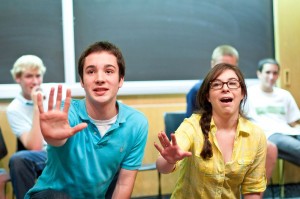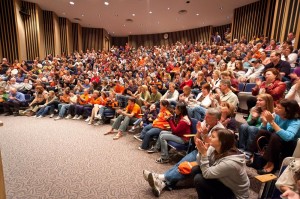By Courtney Flagg
News Editor
People need to listen to their inner voice to be successful, said Edward Herrmann ’65 in an interview last Saturday afternoon before his production of “Mazurka: My Friend Chopin.”
Herrmann was on campus for Family Weekend to play the role of August Franchomme in “Mazurka: My Friend Chopin.” Despite his exhausting day, Herrmann took time out of his busy schedule to answer some questions regarding acting, the University and the future of students.
“I honestly don’t remember the last time I was at Bucknell and actually got to experience the campus life. I’ve been back here a number of times. My daughter went here; she was a part of the dance program. My niece went here and she was captain of the rowing team,” Herrmann said.
Herrmann, probably most known by students as the grandfather on the sitcom “Gilmore Girls,” began acting his first year at the University.
“I was asked to take part in a production by some of the guys in my fraternity. I played a soldier in ‘Macbeth.’ Back then the theater didn’t have its own department like it does today; it was part of the English Department. So, after appearing in multiple different productions on campus, I switched my major from history to English,” Herrmann said.
“Theater seemed to be something that I could do. After Bucknell, I applied to Yale [theater school]. I ended up getting a Fulbright scholarship to The London Academy of the Dramatic Arts. In 1970 I went to New York. And that, I guess, that is the story of me,” he said.
Fame did not necessarily come easily to Herrmann, who worked very hard to master his craft. One of Herrmann’s most beloved gifts to the University is a collection books located in the Vaughan Literature Library.
“On the second bay on the left, there are a bunch of books by English authors that I got secondhand. That was my first donation to the University and I was very proud of it,” Herrmann said.
It was hard for Herrmann to name some of his favorite roles and productions because as it soon became clear, he loves acting too much to choose only one role. He did like working on “Gilmore Girls” but felt that, as in most successful television series, actors “can become ‘lazy’ because the writers begin to write your character to your own personality.”
Herrmann said that if students want to get into the business, it is important they receive the proper training.
“Learn how to do it [acting]. Harvey Powers gave me some really great advice when I was studying here. I did a production of ‘Oh Dad, Poor Dad, Mama’s Hung You in the Closet and I’m Feeling So Sad,’ which is a vicious satire. Everyone thought I did an excellent job and were telling me to go straight into the business. And Harvey…said I needed proper training,” Herrmann said.
“If you want to go into film editing and style, you want to go to a good film school. Some people choose UCLA over Wesleyan (which happens to have one of the best film programs in the country) but this isn’t always a good thing. When you’re surrounded by Hollywood, the business aspect of film surrounds you. It’s hard for you to develop your own voice, to figure out what story you want to tell,” Herrmann said.
Herrmann said it is critically important to find out what you are drawn to, no matter what it may be, and follow that.
“Choose what draws you. What’s the music that sings to you? This school gave me some excellent things. I had some excellent classes, some excellent teachers and professors, each of which, in teaching me about English and history, taught me something about myself because they helped me realize what I love to do. It’s important that you define your own journey. No one else can,” Herrmann said.


